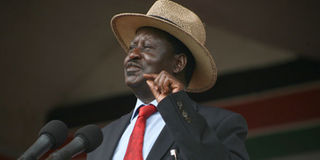Pay raise for Kenyan workers

Prime Minister Raila Odinga addresses citizens during celebrations to mark Labour Day at Nairobi's Uhuru Park on May 1,2010. Photo/HEZRON NJOROGE
What you need to know:
Modest increment will cushion the workers against the high prices of commodities that have eroded people’s purchasing power, say Prime Minister.
Prime Minister Raila Odinga has ordered employers to raise the minimum wage for all the country’s workers by at least 10 per cent.
Speaking during the country’s Labour Day celebrations at Nairobi’s Uhuru Park, Mr Odinga directed the Ministry of Labour to implement the directive.
The PM’s order means that workers who since 2009 have been earning between Sh3,043 and Sh6,130 will all enjoy a rise of between Sh300 and Sh700.
Last year, the government set the minimum wage for agriculture workers at Sh3,043 and for those under the general category in Nairobi, Mombasa and Kisumu cities at Sh6,130.
Workers in all municipalities including Mavoko, Ruiru and Limuru Town Councils had their salaries pegged at Sh5,655 while those in the rest of the country have been earning a minimum of Sh3,270.
With the inflation rate for March at 7 per cent, the workers will feel a little cushioned with the Labour Day tidings as far as the cost of living is concerned.
The minimum wage for workers in the industrial sector was last raised in 2006 when it went up from Sh4,817 to Sh5,395.
The good news to the workers almost went unnoticed following a pandemonium as the workers strived to shelter from the rains.
Mr Odinga and Central Organisation of Trade Union boss Francis Atwoli used the event to champion employment creation for Kenya’s youth.
Mr Atwoli accused the Federation of Kenya Employers as being “hell-bent” on harassing workers. He asked employers to go slow on the outsourcing of labour-intensive projects and instead employ locals.
Ms Jacqueline Mugo, the FKE’s chief executive saw her attempts to lobby workers from the flower and telecommunication not to go on strike melt, as Mr Atwoli insisted that “strike is still on.”
“If flower companies brought in Sh36 billion last year, how much of that money went into the workers’ pockets?” asked the Cotu boss.
“Come May 17, that strike is still on unless all their demands are met.” Ms Mugo had petitioned Mr Atwoli and the workers to call off the strike and engage in dialogue.
Similarly, Mr Atwoli upbraided the government for putting emphasis on casual employment, like it was the case, with the contract package for nurses and teachers in the current budget and also through the youth employment programme -- the Kazi kwa Vijana programme.
Mr Atwoli said the unemployment problem in the country will keep rising unless the government moved in to lower the energy cost and the lending rates.
He pushed for price controls for fuel, saying the fuel retailers were “exploiting Kenyans” by charging “arbitrary and exorbitant prices”.
According to Mr Atwoli, the regional economy is one of the avenues through which the government can create more jobs for youth.
“It is unfortunate that the ministry of East Africa Community does not value workers despite the fact that we were instrumental in forging the bloc,” Mr Atwoli said.
The Prime Minister too noted that with 750,000 youths leaving school every year, the government’s worry was how to absorb them into the job market.
He alluded to a ban on the importation of uniforms for the disciplined forces as one of the measures to ensure that money remained in Kenya.
The PM’s focus was also on 'the labour export policy’ that is expected to “weed out bogus employment agencies which have been exploiting Kenyans”.
Mr Odinga added that a Micro and Small Enterprises Bill had been developed with an aim of ending poverty and unemployment.




